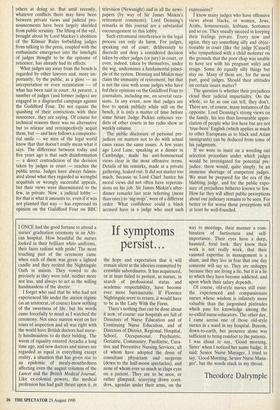If symptoms
persist...
I ONCE had the good fortune to attend a nurses' graduation ceremony in an Afri- can hospital. How beautiful the nurses looked in their brilliant white uniforms, their faces radiant with pride! The most touching part of the ceremony came when each of them was given a lighted candle and they recited the Nightingale Oath in unison. They vowed to do precisely as they were told, neither more nor less, and always to act as the willing handmaidens of the doctor.
I forget who said that he who had not experienced life under the ancien regime (as an aristocrat, of course) knew nothing of the sweetness of life, but his words came forcefully to mind as I watched the ceremony. Not since matron went on her tours of inspection and all was right with the world have British doctors had nurse- ly handmaidens to do their bidding. The worm of equality entered Arcadia a long time ago, and now doctors and nurses are regarded as equal in everything except reality, a situation that has given rise to an epidemic of mealy-mouthedness affecting even the august columns of the Lancet and the British Medical Journal. Like ex-colonial powers, the medical profession has had guilt thrust upon it, in
the hope and expectation that it will remain silent at the idiocies committed by erstwhile subordinates. It has acquiesced, or at least failed to protest, as nurses, in search of professional status and academic respectability, have become ever more bureaucratic. If Florence Nightingale were to return, it would have to be as the Lady With the Form.
There's nothing that can be done about it now, of course: our hospitals are full of Directors of Nurse Education and of Continuing Nurse Education, and of Directors of District, Regional, Hospital, School, Occupational, Psychiatric, Geriatric, Community, Paediatric, Cura- tive and Preventive Nursing Services, all of whom have adopted the dress of consultant physicians and surgeons (down to the half-moon spectacles), and none of whom ever so much as claps eyes on a patient. They are to be seen, or rather glimpsed, scurrying down corri- dors, agendas under their arms, on the way to meetings, their manner a com- bination of furtiveness and self- importance. Their eyes have a deep, haunted, feral look: they know their work is not really work, that their vaunted expertise in management is a sham, and they live in fear that one day someone will say so. They are unhappy because they are living a lie, but it is a lie to which they have become addicted, and upon which their salary depends.
Of course, old-style nurses still exist: the experienced and compassionate nurses whose wisdom is infinitely more valuable than the jargonised platitudes which pass for knowledge among the so-called nurse-educators. The other day, I came across one of those old-style nurses in a ward in my hospital. Buxom, down-to-earth, her presence alone was sufficient to bring comfort to the patients. I was about to say, 'Good morning, Sister' when I noticed her name badge. It said: Senior Nurse Manager. I tried to say, 'Good Morning, Senior Nurse Mana- ger', but the words stuck in my throat.
Theodore Dalrymple










































 Previous page
Previous page